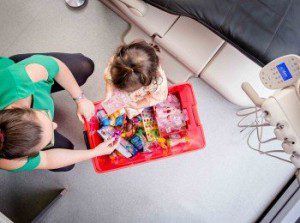SUGAR It’s the number one preventable reason for tooth decay in children and other dental problems.

Sweet treats may be fun for kids, but sugar is the leading cause for tooth decay in children. Our dentists can help your child’s teeth stay healthy “A diet that contains a lot of sugar, especially when eaten frequently, is the main factor contributing to tooth decay in kids,” confirms Dr Renee Ashby, partner dentist at Shepherds Hill Dental Centre.“Most of us know that junk foods like lollies and chocolates contain a lot of sugar, but many mums and dads aren’t aware that there’s a lot of hidden sugar in many foods that are considered healthy, like dried fruits, savoury crackers and muesli bars.”
- The second biggest factor is poor brushing habits.
- Thirdly, some kids may be predisposed to decay because they’re born with mineral defects in their teeth, called tooth hypomineralisation or chalky teeth.”
Here, Dr Ashby encourages parents to help their kids say ‘no’ to sugar and look after their teeth.
How does sugar cause tooth decay in children?
We all have bacteria living in our mouths. However, the bacteria alone won’t cause decay. It’s the frequent intake of sugar that feeds the bacteria and causes the decay process.
Having a good diet is the best protection against decay.
Of course, we all enjoy a sweet treat every now and then, but it’s best to limit it to meal times, to allow the teeth enough time to recover from the bacterial acid attacks.
Until what age should parents brush their child’s teeth?
If they’re tiny – babies, toddlers, small children – we’ll get Mum or Dad to do their teeth.
When they’re able to have a go themselves, we recommend that mum or dad supervise them until they’re about six years of age, making sure they get to the back molars.
Most kids don’t know how to brush their back teeth or have the hand skills to do so. They just wave the toothbrush around the front! That’s one of the reasons why most kids get decay in their back baby molars.
Why is decay so bad? They’re just baby teeth
- Chronic pain and infection Decay can cause pain, affect concentration at school and result in behavioural issues. None of us want to see a child suffering from an abscess or an infection. There can be a perception that kids don’t feel chronic pain the same way that adults do, so parents may not take them seriously when they’re complaining about being in pain.
- Early loss of teeth If a child has decay in their baby teeth and needs to have them removed, it can affect the alignment of their adult teeth as they come through, and cause spacing issues.
- Higher risk of decay in adult teeth We know from research that children who experience decay in their baby teeth are more likely to experience decay in their adult teeth.
- Dental phobia Decay has a snowball effect. A young child in pain may be unwilling to let someone look in their mouth and this can lead to their decay worsening and result in abscesses. When they eventually come in for treatment, it’s often for something complex like a tooth removal.
What are the signs of tooth decay in children?
We coach mum and dad to look at their child’s teeth regularly because this is when they’ll notice issues:
- Any holes – especially on the back molars
- Dark brown or orangey areas
- Chalky white spots
- Anything that doesn’t look normal
- Swelling in the gums – this could indicate an infection or abscess
- The child says their tooth hurts or avoids eating on it
Should my child see a paediatric dentist?
If your child is coming in for regular check-ups, hopefully they won’t need to. Some people do go straight to a paediatric dentist, but most of the time they’d need a referral anyway.
If there’s a problem – and it depends on the degree – we’ll refer you to a paediatric dentist if they:
- Have extensive hypomineralisation on all their teeth
- Are very young and the treatment is beyond what we can do for them in a general dental practice
- Have a medical condition or special needs
 Does every decayed tooth need to be taken out?
Does every decayed tooth need to be taken out?
No, it depends on the size of the decay. If we catch tooth decay in children while it’s still small, you can fill the tooth and save it.
If the decay has reached the nerve inside the tooth, then it may need to be removed.
If you spot decay, what’s the first step?
Book an appointment with us on 08 8278 6858 or request an appointment online.
If it’s fairly routine, we’ll probably take an X-ray to see how big the decay is because that’ll determine what needs to be done – whether the tooth needs to be removed or if your child needs to see a specialist.


 Does every decayed tooth need to be taken out?
Does every decayed tooth need to be taken out?